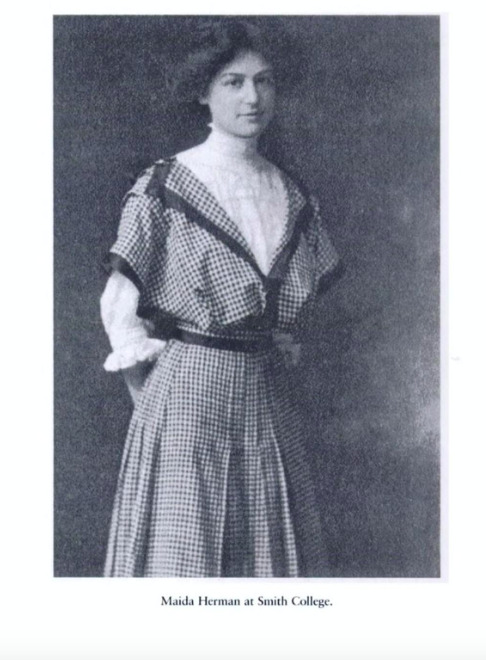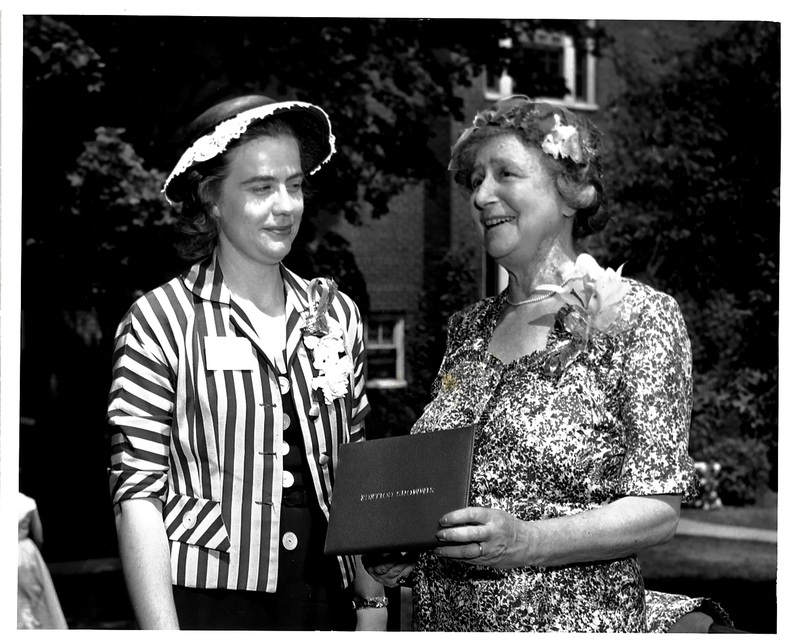Maida Herman Solomon '14
Faculty, Social Work
Dublin Core
Title
Maida Herman Solomon '14
Faculty, Social Work
Faculty, Social Work
Description
Maida Herman was born in Boston in 1891 to Hannah (Adler) Herman and Joseph Herman, a shoe manufacturer. She graduated from Boston Girls’ Latin School in 1908, and then received a B.A. from Smith College in 1912. She pursued further undergraduate study at Simmons, earning a B.S. in Secretarial Studies in 1914. During her college years, Herman became interested in suffrage, joining the Massachusetts Women’s Suffrage Association during her senior year at Smith and later carrying a banner in the 1915 Boston Suffrage Parade.
Herman married Harry Caesar Solomon, a clinical psychiatrist, in 1916, and the couple had four children. Harry introduced his wife to Mary Jarrett, head social worker at the Boston Psychopathic Hospital, where he also worked. Maida soon developed her own interest in psychiatric social work, and Jarrett hired her as a fieldworker for the hospital. Solomon also became involved in her husband’s research, and they co-authored several influential books and papers, including Syphilis of the Innocent (1920).
By the mid-1920s, Solomon had left hospital work to pursue community organizing and education, joining the board of Hecht House, a Jewish settlement house for girls. In 1934, the Simmons College School of Social Work recognized Solomon’s contributions to the field of social work and recruited her to develop a more robust curriculum for its new program in psychiatric social work. Under her guidance, the program grew from an undergraduate course to a Master of Science degree with a focus on fieldwork practice and individual tutorials. Solomon also served for more than twenty years as a professor of Social Economy and, in 1942, became department head of the Simmons School of Social Work. She was known on campus for her engagement with students, assisting graduates with job placements and supporting married women who wished to pursue careers outside of the home.
Solomon left Simmons as a Professor Emerita in 1957, retiring, she said, “only from Simmons, not my profession.” She continued working as a research and social work consultant until her early nineties, serving various Boston institutions, including the Boston State Hospital and the Massachusetts Mental Health Center. She maintained close connections to Simmons, working annually with the committee for the School of Social Work’s award named in her honor.
During her long career as an activist, Solomon was involved in a wide variety of committees and organizations, including the Boston Community Fund, the Massachusetts Society of Social Hygiene, and the Red Cross’s Advisory Committee of Psychiatric Social Workers. Throughout her professional life, she maintained an active presence in Jewish cultural and social organizations, serving as Vice President of the Jewish-founded Union Park Forum in 1915 and as an officer of the Boston section of the National Council of Jewish Women in the 1920s. She was also a founding member and the first president of the American Association for Psychiatric Social Workers (AAPSW).
Solomon died of a heart attack in January of 1988. She is remembered as a pioneer in the fields of mental health research and psychiatric social work.
Herman married Harry Caesar Solomon, a clinical psychiatrist, in 1916, and the couple had four children. Harry introduced his wife to Mary Jarrett, head social worker at the Boston Psychopathic Hospital, where he also worked. Maida soon developed her own interest in psychiatric social work, and Jarrett hired her as a fieldworker for the hospital. Solomon also became involved in her husband’s research, and they co-authored several influential books and papers, including Syphilis of the Innocent (1920).
By the mid-1920s, Solomon had left hospital work to pursue community organizing and education, joining the board of Hecht House, a Jewish settlement house for girls. In 1934, the Simmons College School of Social Work recognized Solomon’s contributions to the field of social work and recruited her to develop a more robust curriculum for its new program in psychiatric social work. Under her guidance, the program grew from an undergraduate course to a Master of Science degree with a focus on fieldwork practice and individual tutorials. Solomon also served for more than twenty years as a professor of Social Economy and, in 1942, became department head of the Simmons School of Social Work. She was known on campus for her engagement with students, assisting graduates with job placements and supporting married women who wished to pursue careers outside of the home.
Solomon left Simmons as a Professor Emerita in 1957, retiring, she said, “only from Simmons, not my profession.” She continued working as a research and social work consultant until her early nineties, serving various Boston institutions, including the Boston State Hospital and the Massachusetts Mental Health Center. She maintained close connections to Simmons, working annually with the committee for the School of Social Work’s award named in her honor.
During her long career as an activist, Solomon was involved in a wide variety of committees and organizations, including the Boston Community Fund, the Massachusetts Society of Social Hygiene, and the Red Cross’s Advisory Committee of Psychiatric Social Workers. Throughout her professional life, she maintained an active presence in Jewish cultural and social organizations, serving as Vice President of the Jewish-founded Union Park Forum in 1915 and as an officer of the Boston section of the National Council of Jewish Women in the 1920s. She was also a founding member and the first president of the American Association for Psychiatric Social Workers (AAPSW).
Solomon died of a heart attack in January of 1988. She is remembered as a pioneer in the fields of mental health research and psychiatric social work.
Citation
“Maida Herman Solomon '14
Faculty, Social Work,” Suffrage at Simmons, accessed February 18, 2026, https://beatleyweb.simmons.edu/suffrage/items/show/82.
Faculty, Social Work,” Suffrage at Simmons, accessed February 18, 2026, https://beatleyweb.simmons.edu/suffrage/items/show/82.

